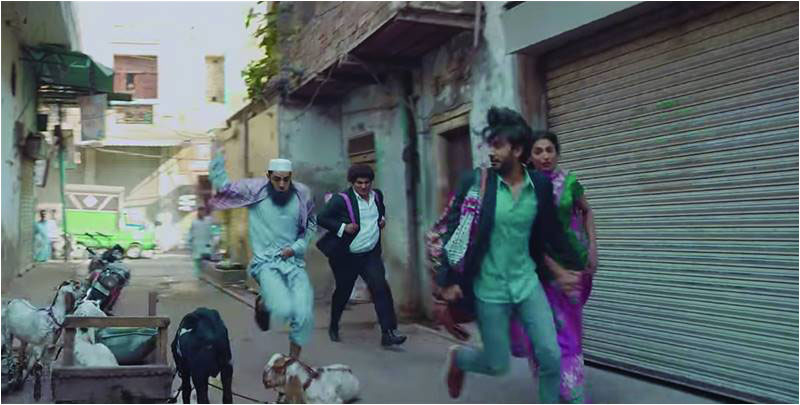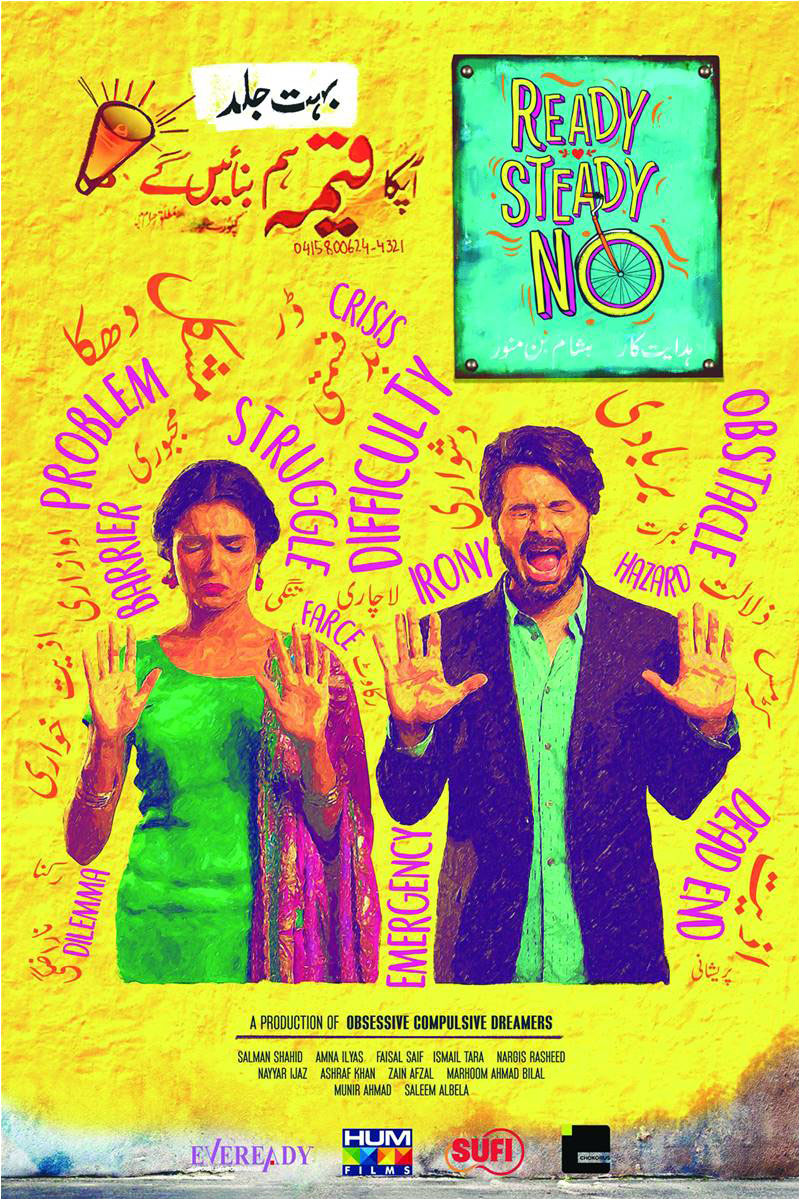
We’ve been craving, whining and bellowing in this space, for a Pakistani comedy film that a) doesn’t fall within the realm of the heist genre and b) doesn’t appear to be a rehash of its peers or recent predecessors – on this, or the other, side of the border.
Ready Steady No is that film.
Is it the perfect laughter riot? Not necessarily. Is it the ultimate benchmark for the genre? Far from it. In fact, the positives of Ready Steady No are almost as many in number, and magnitude, as its drawbacks. But even that is a mammoth achievement that places the film head and shoulders above its peers.
The film features, in large parts, some of the finest – and the most refined – comic writing that Lollywood has seen in recent times. Ironically – especially since the script uses irony in abundance – the film’s greatest strength is simultaneously its major drawback, since the audience that it has to attract to multiplexes doesn’t quite have the taste for alt-comedy and indie humour that Ready Steady No oozes with.

It is no coincidence that the loudest laughs the film receives are on the Punjabi punches or nuggets of slapstick humour, which despite being the movie’s commercial lifeline isn’t exactly its main offering. Ready Steady No oscillates between avant garde satire and cheesy clichés, and appears to be at ease creating a mélange out of the two. But unfortunately, it also fluctuates between a laughter riot and prolonged lulls, which will test the patience of a generation already hiking the scales of attention deficit.
At face value Ready Steady No is a romantic comedy that picturises “bhaag ke shaadi karna” or “runaway wedding” in its most outrageously literal sense. However, the film actually is a multi-layered satire, and multi-pronged caricaturing of our society.
Razia (Amna Ilyas) and Faisal (Faisal Saif) are lovers who decide to elope after their parents object to their marriage over caste differences. Razia’s father (Salman Shahid) is Gujjar, while Faisal’s parents (Ismail Tara and Nargis Rasheed) are Jutts with neither party willing to compromise on their casteist prejudice.
Razia’s father wants her to marry her cousin Muneer (Muneer Ahmed), who is a detective by profession. Once Razia and Faisal decide to run away, Advocate Mazhar Fakhar – yes yes – (Marhoom Ahmad Bilal) and nikah-khwan Maulana (Zain Afzal) bring forth their own sets of hindrances, instead of facilitating the wedding.

The satire in play is multi-layered and hence the soial ills being critiqued – and the tools being used to do so – cater to a wide gamut of intellect. Therefore, while a jibe at the caste-system might be the most prominent offshoot of the script, the storyline takes wide-ranging digs at the media, judiciary, police and perhaps most daringly, Islamist orthodoxy.
The satirical shroud that it weaves around such controversial subjects is what lets Ready Steady No offer progressive, and incisive, commentary on excommunicating fatwas, systematic casteism bigotry and linguistic imperialism. In fact, if you can understand Urdu, Punjabi and Saraiki, the punches come at you in three dimensions.
In that regard, the film rests almost entirely on the shoulders of debutant Hisham bin Munawwar, who is the producer, director and the writer of Ready Steady No. In addition to all these titles, Munawwar clearly is a fine satirist with natural wit and a penchant for intelligent comedy.
Given that he has worked with Shoaib Mansoor, many have drawn parallels with the directorial skills that Munawwar has displayed in Ready Steady No. Any such comparisons are, of course, premature as things stand, but there is no doubting the talent and ability.
However, what visibly became the greatest predicament for Hisham bin Munawwar is the budgetary constraint. The haphazardly thrown in product placements underline it, but the low budget meant that he had to assemble a cast that in many parts didn’t complement his script.
Amna Ilyas shines the brightest and veterans Salman Shahid, Ismail Tara and Nayyar Ejaz bring their finest to the fore. Marhoom Ahmad Bilal and Zain Afzal play their parts decently, especially given their significance to the more sardonic elements of the script, even if there are clear weaknesses in both armours. Muneer Ahmed provided some of the slapstick highlights, but his character perhaps peaks too early and becomes repetitive as the movie went on – which is more the director’s fault than his.
Even so, it was Faisal Saif’s performance that was the greatest disappointment, and underlined the limitations that Hisham bin Munawwar had to work with. Those limitations further pushed him to be the lyricist and even singer for a pretty impressive soundtrack, which features the melodious ‘Dekho Dekho’ and a hard-hitting grunge track by Badnaam.
The shortcomings might keep the masala audiences at bay, but Ready Steady No is a film that caters to the political aware buffs of intelligent social satire – quite contrary to what passes off under the same label in many of our news channels every night.
With better acting, crisper editing and more consistency, Ready Steady No might have been a towering masterpiece.
As things stand, it’s a satirical marathon that is the harbinger of hope that self-critical, progressive, intellectually challenging humour can find a place in Lollywood after all.
Ready Steady No is that film.
Is it the perfect laughter riot? Not necessarily. Is it the ultimate benchmark for the genre? Far from it. In fact, the positives of Ready Steady No are almost as many in number, and magnitude, as its drawbacks. But even that is a mammoth achievement that places the film head and shoulders above its peers.
The film features, in large parts, some of the finest – and the most refined – comic writing that Lollywood has seen in recent times. Ironically – especially since the script uses irony in abundance – the film’s greatest strength is simultaneously its major drawback, since the audience that it has to attract to multiplexes doesn’t quite have the taste for alt-comedy and indie humour that Ready Steady No oozes with.

It is no coincidence that the loudest laughs the film receives are on the Punjabi punches or nuggets of slapstick humour, which despite being the movie’s commercial lifeline isn’t exactly its main offering. Ready Steady No oscillates between avant garde satire and cheesy clichés, and appears to be at ease creating a mélange out of the two. But unfortunately, it also fluctuates between a laughter riot and prolonged lulls, which will test the patience of a generation already hiking the scales of attention deficit.
At face value Ready Steady No is a romantic comedy that picturises “bhaag ke shaadi karna” or “runaway wedding” in its most outrageously literal sense. However, the film actually is a multi-layered satire, and multi-pronged caricaturing of our society.
Razia (Amna Ilyas) and Faisal (Faisal Saif) are lovers who decide to elope after their parents object to their marriage over caste differences. Razia’s father (Salman Shahid) is Gujjar, while Faisal’s parents (Ismail Tara and Nargis Rasheed) are Jutts with neither party willing to compromise on their casteist prejudice.
Razia’s father wants her to marry her cousin Muneer (Muneer Ahmed), who is a detective by profession. Once Razia and Faisal decide to run away, Advocate Mazhar Fakhar – yes yes – (Marhoom Ahmad Bilal) and nikah-khwan Maulana (Zain Afzal) bring forth their own sets of hindrances, instead of facilitating the wedding.

The satire in play is multi-layered and hence the soial ills being critiqued – and the tools being used to do so – cater to a wide gamut of intellect. Therefore, while a jibe at the caste-system might be the most prominent offshoot of the script, the storyline takes wide-ranging digs at the media, judiciary, police and perhaps most daringly, Islamist orthodoxy.
The satirical shroud that it weaves around such controversial subjects is what lets Ready Steady No offer progressive, and incisive, commentary on excommunicating fatwas, systematic casteism bigotry and linguistic imperialism. In fact, if you can understand Urdu, Punjabi and Saraiki, the punches come at you in three dimensions.
In that regard, the film rests almost entirely on the shoulders of debutant Hisham bin Munawwar, who is the producer, director and the writer of Ready Steady No. In addition to all these titles, Munawwar clearly is a fine satirist with natural wit and a penchant for intelligent comedy.
Given that he has worked with Shoaib Mansoor, many have drawn parallels with the directorial skills that Munawwar has displayed in Ready Steady No. Any such comparisons are, of course, premature as things stand, but there is no doubting the talent and ability.
However, what visibly became the greatest predicament for Hisham bin Munawwar is the budgetary constraint. The haphazardly thrown in product placements underline it, but the low budget meant that he had to assemble a cast that in many parts didn’t complement his script.
Amna Ilyas shines the brightest and veterans Salman Shahid, Ismail Tara and Nayyar Ejaz bring their finest to the fore. Marhoom Ahmad Bilal and Zain Afzal play their parts decently, especially given their significance to the more sardonic elements of the script, even if there are clear weaknesses in both armours. Muneer Ahmed provided some of the slapstick highlights, but his character perhaps peaks too early and becomes repetitive as the movie went on – which is more the director’s fault than his.
Even so, it was Faisal Saif’s performance that was the greatest disappointment, and underlined the limitations that Hisham bin Munawwar had to work with. Those limitations further pushed him to be the lyricist and even singer for a pretty impressive soundtrack, which features the melodious ‘Dekho Dekho’ and a hard-hitting grunge track by Badnaam.
The shortcomings might keep the masala audiences at bay, but Ready Steady No is a film that caters to the political aware buffs of intelligent social satire – quite contrary to what passes off under the same label in many of our news channels every night.
With better acting, crisper editing and more consistency, Ready Steady No might have been a towering masterpiece.
As things stand, it’s a satirical marathon that is the harbinger of hope that self-critical, progressive, intellectually challenging humour can find a place in Lollywood after all.

